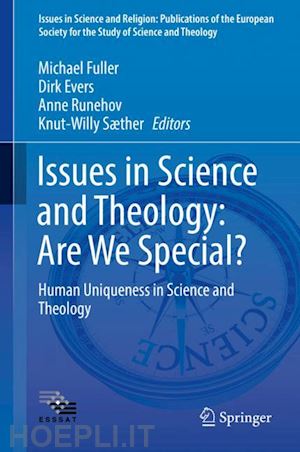
Questo prodotto usufruisce delle SPEDIZIONI GRATIS
selezionando l'opzione Corriere Veloce in fase di ordine.
Pagabile anche con Carta della cultura giovani e del merito, 18App Bonus Cultura e Carta del Docente
Chapter 1. Being Human in a Cosmic Context (David Wilkinson).- Chapter 2. Is Life Unique? Perspectives from Astrobiology and Synthetic Xenobiology (Elisabeth Loos).- Chapter 3. Are We Special? Humanity and Extraterrestrial Life (Alfred Kracher).- Chapter 4. The Cosmic Christ’s End: The Cosmological Meaning of Christ in an Interreligious Perspective, with a Focus on Jewish-Christian Eschatology (Andreas Losch).- Chapter 5. Darwinian Evolution of the Human Body and Culture (Jerzy Dzik).- Chapter 6. What are human beings (that you are mindful of them)? Notes from neo-Darwinsim and neo-Aristotelianism (Jonathan Jong).- Chapter 7. Does Religious Behavior
Render Humans Special? (Lluis Oviedo and Jay R. Feierman).- Chapter 8. Is Homo naledi Going to Challenge our Presuppositions on Human Uniqueness? (Rubén Herce).- Chapter 9. Theology Looking at Culture Through the Lenses of Science (Ivan Colagè).- Chapter 10. Strong Artificial Intelligence and Imago Hominise: 9pt; line-height: 115%; font-family: Helvetica, sans-serif; background-image: initial; background-position: initial; background-size: initial; background-repeat: initial; background-attachment: initial; background-origin: initial; background-clip: initial;">: The risks of a Reductionist Definition of Human Nature (Sara Lumbreras).- Chapter 11. Boundless Riches: Big Data, the Bible and Human Distinctiveness (Michael Fuller).- Chapter 12. Do only Humans Sin? In Conversation with Frans de Waal (Ernst M. Conradie). Chapter 13. Human Uniqueness or Anthropocentrism? Semantic, Anthropological and Theological Clarifications in Dialogue with Damasio’s Neuroscience (Luis O. Jiménez-Rodríguez).- Chapter 14. How may we Justify the History of the Universe?.- Chapter (Michael Heller).- Chapter 15. Human Uniqueness and the Normative Conception of the Rational (James Collin).- Chapter 16. Special? Oh, Please! And Yet ...(Roland Karo). Chapter 17. Aren’t we Animals? Deconstructing or Decolonizing the Human – Animal Divide (Angela Roothaan). Chapter 18. ‘What Is Man That You Are Mindful of Him?’ (Ps 8:4): How Theology Can Help to Answer the Question: What is it to be a Human Being? (Johanna Rahner). Chapter 19. Uniqueness and the Presence of the Image: Towards a Pneumatological Foundation for Human Uniqueness and the Image of God (Joanna Leidenhag).- Chapter 20. Human Uniqueness and Technology: Are we Co-Creators with God?(Victoria Lorrimar).- Chapter 21. Pope Francis’ Encyclical Laudato si’: Ecological Concerns and a Shift of Theological Approach to the Problems of Humanity and the Earth (Jacek Poznanski).- Chapter 22. Are Humans Special? Examining John Haught’s Idea of ‘Information’ and the Daoist Idea of Qi in the Zhuangzi (Jaeho Jang).Michael Fuller has taught science and theology at the University of Edinburgh since 1998. He is the author of a monograph and numerous articles dealing with the interface of science and religion, and he has edited many symposia relating to this subject. He is Chair of the UK Science and Religion Forum, and Vice-President for Publications of the European Society for the Study of Science and Theology. He is an Anglican Priest, and for 15 years was Pantonian Professor at the Theological Institute of the Scottish Episcopal Church. His research interests include ethical issues raised by new and emerging sciences.
Dirk Evers is Professor of Dogmatics and Philosophy of Religion at Martin-Luther-University Halle-Wittenberg, Germany. Before joining Halle University in 2010 as a faculty member, he worked as assistant professor at Tübingen University under Eberhard Jüngel. Since his doctoral thesis on cosmology and doctrine of creation in 2000 he has been doing interdisciplinary work at the intersection of science and theology. Since 2014 he has been president of ESSSAT (European Society for the Study of Science and Theology), and he is managing editor of the journal Philosophy, Theology, and the Sciences.
Anne L.C. Runehov
-family: Helvetica, sans-serif;">has a Reader (Associate Professor) degree from Uppsala University. She earned a Doctoral degree in Philosophy of Religion at Uppsala University, and a Masters degree in Theoretical Philosophy, majoring in Philosophy of Mind, at the same university. Her latest monograph "The Human Being, the World and God" was published 2016 by Springer. She is the Editor in Chief of the 4 volume Encyclopaedia of Sciences and Religions, Springer 2013. She is co-editor for the volume: "Processes of Believing: The Acquisition, Maintenance, and Change in Creditions", Springer 2017. She was also Editor in Chief for the series Copenhagen University Discussions in Science and Religion, Faculty of Theology publications, Copenhagen until May 2014. She is also field editor for the European Journal of Science and Theology. Her first monograph "Sacred or Neural? The Potential of Neuroscience to Explain Religious Experiences" was published by Vandenhoeck & Ruprecht, 2007: it is based on her doctoral thesis, for which she received the 2006 ESSSAT research prize. Her main research interests lie on the interface of Philosophy of Religion, Philosophy of Mind and Neuroscience, i.e. neurophilosophy.
Knut-Willy Sæther is Professor at Department of Religious Studies, Volda University College, and NLA University College, Bergen, Norway. He received his doctoral degree from the Norwegian University of Technology and Science, Trondheim (2005) for a dissertation in theology and science. His main area of work is the philosophy of religion and he does interdisciplinary work including philosophy, theology, aesthetics and science.
He is currently Scientific Program Officer at European Society for the Studies in Science and Theology (ESSSAT). He has published several books.










Il sito utilizza cookie ed altri strumenti di tracciamento che raccolgono informazioni dal dispositivo dell’utente. Oltre ai cookie tecnici ed analitici aggregati, strettamente necessari per il funzionamento di questo sito web, previo consenso dell’utente possono essere installati cookie di profilazione e marketing e cookie dei social media. Cliccando su “Accetto tutti i cookie” saranno attivate tutte le categorie di cookie. Per accettare solo deterninate categorie di cookie, cliccare invece su “Impostazioni cookie”. Chiudendo il banner o continuando a navigare saranno installati solo cookie tecnici. Per maggiori dettagli, consultare la Cookie Policy.